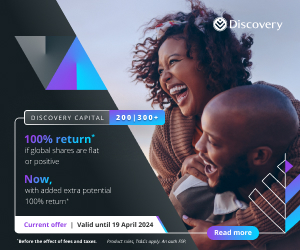Incorporating an offshore component into an investment portfolio makes sense for every investor; doing so provides exposure to the world’s leading economies and high growth industries while spreading the investment risk.
Amid forecasts of declining domestic growth and extreme uncertainty, when offshore investing seemed the obvious choice, the past few weeks have shown that no economy is immune to a global crisis.
Many will be enticed by projected returns, the buzz around tech stocks, or the sense of security of having dual citizenship that comes with investing in international property. However, in my professional experience, decisions that are influenced by fear, vanity or greed are the worst an investor can make.
Do-it-yourself investors tend to focus on the markets, the economy, the asset manager’s performance and even individual stocks and property. Without a plan, they tend to build their portfolios from the bottom up, focusing on investments piecemeal rather than on how the portfolio as a whole is serving the investment objective.
The possibility that these decisions are based on an irrational assessment is exceptionally high. Nonprofessional investors tend to “trust their gut” – and generally don’t understand market valuations, nor the underlying forces driving the performance of Facebook, Apple, Amazon, Netflix and Google (the FAANG companies), for example.
It follows that these investors wouldn’t necessarily understand, for example, the full impact of COVID-19 on the FAANGs, whether these stocks are currently trading at fair value, or if they’re overpriced or in bubble territory.
Nor do investors realise that owning offshore property often comes with a massive cash obligation, leaving them at the mercy of changes in legislation, economic instability, tax implications and ongoing costs that are often US dollar-euro hedged.
It is important to point out that these asset classes are not a problem in themselves, as they are essential components in principle. However, without guidance, investors may inadvertently expose themselves to an unnecessary gamble.
Successful investing is often about discipline and patience and having the control not to panic or change our investment strategy based on market volatility.
In my experience, going offshore requires some strategic thought and planning on behalf of both the client and the financial adviser to ensure that the journey that is meant to lower risk doesn’t result in the exact opposite. Without guidance, investors can easily make ill-advised decisions unless they follow fundamental investment principles.
The first rule, in my view, is to set a clear goal that will guide the client’s offshore investment strategy. With the help of an expert, this way, the client is in a better position to build a portfolio that’s appropriately structured to meet their specific goals, and not the other way around. However, allowing the strategy to deliver on the investment goal through asset allocation, diversification and rebalancing the portfolio requires the client to stick to the plan.
The adviser adds value by helping clients avoid reacting to the news, yet continue to make the best long-term investment decisions despite market volatility.
The second principle is to manage risk through the choice of markets invested in. Developed and emerging markets, for instance, have different risk profiles and characteristics that influence whether certain markets are more or less of a risk.
The way this may influence investment decisions is that developed markets tend to be highly competitive, efficient and highly liquid in such a scenario. A low-cost index strategy might be more suitable for capturing global market performance because of the broad exposure and lower fees.
Emerging markets, by contrast, tend to have more risk concentration and are generally less efficient. Given these risks, stocks that score highly in environmental, social and corporate governance (ESG) criteria are good investment targets. Incorporating ESG considerations could even become a source of outperformance, as there is some guidance on how to avoid potential bad apples.
The pros and cons of different geographies considered, the next guiding principle investors need to bear in mind is asset allocation.
A well-structured offshore portfolio should be based upon reasonable expectations for risk and returns, and diversified sufficiently to limit exposure to unexpected events. The asset allocation exercise is a fine balancing act that aims to escape volatility and short-term losses, while still growing faster than inflation.
A well-structured offshore portfolio should be based upon reasonable expectations for risk and returns, and diversified sufficiently to limit exposure to unexpected events.
Should a portfolio lack investment with higher growth potential, it’s likely to fall short of long-term financial goals. What people often forget is that inflation can be particularly damaging, because its effects compound over longer time horizons.
The final fundamental principle that investors need to bear in mind when planning their offshore portfolio is the management and transaction costs involved. Costs create an inevitable gap between what the markets return and what investors earn, but keeping expenses down can help narrow that gap.

Markets are unpredictable and cannot be controlled. However, you can manage your costs. Failure to do so can significantly depress a portfolio’s growth over the long term.
In conclusion, successful investing is often about discipline and patience and having the control not to panic or change our investment strategy based on market volatility.
Whether you are bearish on South Africa or not, the reality is that South Africa represents less than 1% of global investable assets, which means that limiting your investment universe to pure South African investments, limits your opportunity. However, regardless of the market, following some fundamental principles could help manage key risks, as financial advisers strive to help clients reach their financial goals.
For more information, contact Kim Rassou at Kim.Rassou@omwealth.co.za or Evan Andreou at Evan.Andreou@omwealth.co.za
Tailored Fund Portfolios is the Discretionary Fund Management offered by Old Mutual Wealth. We create and manage a range of solutions that provide a consistent, reliable approach to investment. Through our consistent process of asset allocation, manager selection and investment philosophy, we have designed a range of solutions to meet your clients’ investment objectives.












